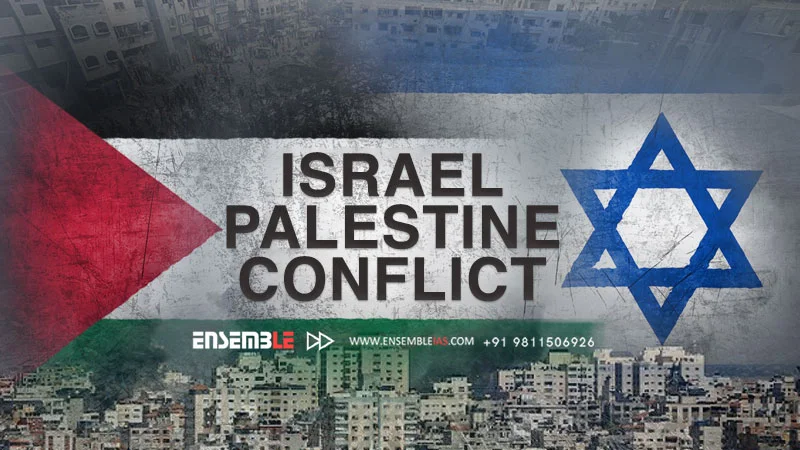ISRAEL-PALESTINE
Context
Recently, Hamas, the militant group that rules the Gaza Strip, launched a devastating onslaught on Israel from the ground, air, and sea, resulting in several casualties. This has reignited the century-old conflict between Israel and Palestine, prompting global and regional engagement.
In recent years, Israel has established numerous peace treaties with neighbouring nations such as the UAE, Saudi Arabia, and others, which are expected to be shaken by the recent incident.
The History of ISRAEL-PALESTINE CONFLICT
The link to join the course : Online Courses
The Israel-Palestine conflict dubbed the “world’s most intractable conflict,” is based on a disagreement over land claimed by Jews as their biblical birthright and by Palestinians seeking self-determination. Despite repeated attempts to resolve the hostilities between the two countries, no peace settlement is in sight.
- Jews have been persecuted throughout history because of their religious beliefs and foreign culture.
- In 1897, Jews formed the Zionist movement to escape oppression and build their own state. In their ancestral country, Israel, they have a state. The World Zionist Organisation was founded to advocate for Israel the construction of a Jewish homeland in Palestine as a result, a large number of Jews started flowing into Palestine and they bought land and started settling down there.
- By 1916, Palestine came under British control after the Sykes-Picot Agreement (a secret agreement between Great Britain and France). This led to the division of the old Ottoman Turkish Empire.
- Later, through the Balfour Declaration, the British foreign secretary James Balfour agreed to establish a Jewish homeland.
- After Nazis gained power in Germany in the 1930s, the Jews influx to Palestine took a major turn with hundreds of thousands of them resettled from Europe to Palestine. Arabs saw this as a threat to their homeland and fought bitterly with them. As the British Government remained a mute spectator, violence peaked.
- In 1947, the British Government referred the question of the future of Palestine to the United Nations. The UN voted to split the land into two countries. Jewish people accepted the agreement and declared independence from Israel.
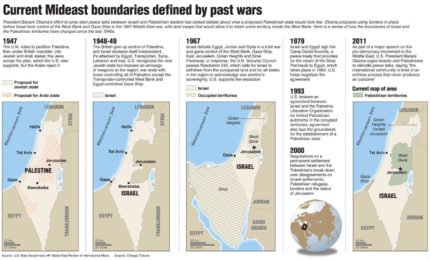
Increasing Israel’s area under occupation
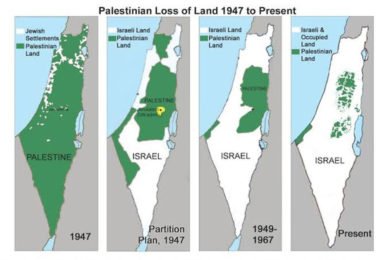
Arab’s fight against Israel (1948-1949)
- The Arabs perceived the establishment of Israel as part of a plot to drive them out of their homeland. As a result, the Arab governments of Egypt, Jordan, Iraq, and Syria declared war on Israel in 1948.
- It’s worth noting that India rejected the UN decision, which Gandhi labelled a crime against humanity. India, on the other hand, recognized Israel in 1950.
- At the end of the battle between Israel and Arab countries, Israel triumphed. Furthermore, it could enlarge its area to a greater extent, and it marked the start of Israel’s expansionist agenda.
- As a result of the war, a huge number of Palestinians have fled or been forced to leave Israel. and establish themselves in refugee camps near Israel’s border. It was the start of the Palestine refugee crisis. In 1964, the PLO (Palestine Liberation Organisation) was founded as a terrorist organisation.
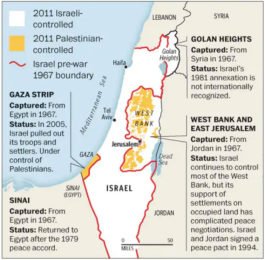
Israel launched a pre-emptive strike on Egypt, Syria, and Jordan in 1967, and by the end of the Six-Day War, Israel had captured:
- Syria’s Golan Heights.
- Jordanian control of the West Bank and East Jerusalem.
- Egypt’s Sinai Peninsula and Gaza Strip.
- The 1967 war is particularly relevant
- to today’s conflict since it gave Israel control of the West Bank and Gaza.
- The Gaza Strip and the West Bank are both home to a considerable number of Palestinians.
- Since the 1967 conflict, Gaza and the West Bank have been referred to as “Occupied Territories.”
The UN Charter and the Reunification of the Sinai Peninsula
- Under the UN Charter, no territorial gains from war are permissible, even when a state is acting in self-defence.
- As a result, in response to the Six-Day War, the UN Security Council passed a resolution titled “Land for Peace.” which required Israel to surrender conquered territories to the vanquished nations.
- Due to Israel’s unwillingness to return to the conquered territories, another Arab-Israeli war began in the Yom Kippur War, 1973, in which Israel suffered some reverses.
- In 1979, Israel and Egypt concluded a peace treaty, and as a result, Israel returned the Sinai Peninsula to Egypt (1982). Egypt was the first Arab country to recognize Israel as a state.
HAMAS and FATAH
- Hamas (Islamic Militant Group) was founded in 1987 with the goal of liberating Palestine through Jihad. It has refused to recognize Israel as a state. It has the backing of Iran and Syria.
- On the other hand, Western nations backed Fatah, a PLO faction led by Yasser Arafat.
Intifada (protest) against Israeli occupation
The First Intifada: With Israel’s expanding settlement in Palestine, tensions between the two sides heightened. The Gaza Strip and the West Bank. Palestinians residing in the West Bank and Gaza Strip fuelled the conflict. The first intifada, or riots, began in 1987.
Oslo Peace Accord: In 1993, Israel and the Palestinian Liberation Organisation signed the Oslo Peace Accord, which was mediated by the United States and Russia. agreement based on the concept of the two-state solution. The Declaration was signed by Palestine and Israel. Principles – in which both nations seek recognition as self-governing authorities. The PLO has acknowledged
Israel. Israel pledged to give the ‘occupied areas’ independence. Territories, however, remained under Possession by Israel.
Camp David Summit (2000): It sought to help the two sides reach an agreement, but the talks fell through. Eventually, they failed. The violence triggered the Second Intifada.
Second Intifada (2000-05): In 2000, a more violent Palestine Uprising began, and a huge number of people were killed. Both sides lost civilians. This is referred to as the second intifada. As a precautionary step, Israel the West Bank Barrier was built along the West Bank to separate Israeli and Palestinian communities.
Gaza Expulsion proposal: This is an Israeli unilateral disarmament proposal in which Israel’s defence forces leave the Gaza Strip and four settlements in the northern West Bank (2005).
Tensions between Hamas and Fatah
Following the Oslo Accord, a Palestinian Authority (PA) with limited self-rule capacity in the occupied territories was established, but this resulted in political power struggles between Hamas and Fatah.
- Hamas rejects the Oslo peace treaty and the two-state peace resolution. They want control over the entire state. Gaza is under them. Iran is a supporter of Hamas.
- Fatah – accepts the Oslo peace treaty and begins peace negotiations. They have control of the West Bank.
When Hamas won the Palestinian election in 2006, it heightened the power struggle between Fatah and Hamas. After a protracted military conflict, Palestinian rivals Fatah and Hamas signed a Reconciliation Pact in 2011.
- Currently, Hamas controls Gaza, while Fatah controls the West Bank region of Palestine Settlements in Israel.
- Protective Edge Operation: Israel is punishing Hamas for kidnapping and killing Israeli settlers.
Israel-Palestine conflict and the US
- The United States has played an important role as a mediator in the Israel-Palestine dispute. However, Palestinians had long questioned its trustworthiness as a mediator.
Take note: The United States has more Jews than Israel. Jews wield significant power in the US media and business.
- In addition, Israel receives over $3 billion in direct foreign assistance each year, which is nearly one-fifth of the total United States’ whole international aid budget.
- On the other hand, the US has made it clear that it will veto any Palestinian aspiration for statehood. As a result, Palestine had to be content with a UN ‘non-member observer’ status.
- However, the US-Israel relationship deteriorated during Obama’s second term. Iran’s Nuclear Programme The 2015 accord upset Israel, and it chastised the US for it.
- The Obama administration enabled the United Nations to pass a resolution declaring Israel’s expanding nuclear capability. Illegal settlements in occupied territories. The Obama administration had already blocked by utilising its veto authority in the UN Security Council, Israel has blocked resolutions criticising it.
- With Trump’s new president, which is more pro-Israel, the illegal Israeli settlements Israel’s presence in the West Bank and Gaza may increase.
Important Concerned Areas
|
GAZA STRIP
|
It is under the control of the militant Islamist group Hamas, which ejected forces loyal to the then-governing Palestinian Authority (PA) after a violent rift in 2007.
Since then, Israel and Egypt have restricted the movement of goods and people in and out of Gaza, saying their blockade is needed for security reasons
|
|
WEST BANK
|
The West Bank is a landlocked territory in Western Asia near the Mediterranean coast that comprises the majority of the Palestinian territories. It is bounded to the east by Jordan and the Dead Sea, and to the south, west, and north by Israel.
According to the OSLO ACCORD, the occupied West Bank was divided into three areas- Area A – Under Palestinian control Area B- Under Joint control Area C – Under Israeli control Areas had to be gradually handed over from Israel to Palestine. However, Israel has built separation walls, increased security checkpoints, and permitted illegal colonies in some areas. Israel has been tightening its grip over the West Bank.
|
JERUSALEM |
Since 1948, West Jerusalem has been Israeli territory, with Jews constituting the majority. East Jerusalem, which includes the Old City of Jerusalem and the Al-Aqsa Mosque compound, is dominated by Palestinians and was occupied by Israel in 1967. Israel claims Jerusalem as its capital in its entirety. Palestinians see East Jerusalem as the future capital of a Palestinian state.
|
GOLAN HEIGHTS |
The Golan Heights are a key plateau that Israel acquired from Syria during the 1967 war. In 1981, Israel effectively annexed the land. The United States just recognized Jerusalem and the Golan Heights as part of Israel. |
BRIEFLY MAIN PROBLEM BETWEEN ISRAEL-PALESTINE
There are several subjects on which Israel and the Palestinians cannot agree, including
- What should be done with Palestinian refugees?
- whether Jewish colonies in the occupied West Bank should be allowed to remain or relocated
- whether or not the two parties should share Jerusalem
- probably most importantly whether a Palestinian state should be established alongside Israel.
Peace discussions have been held on and off for more than 25 years, but have yet to resolve the issue.
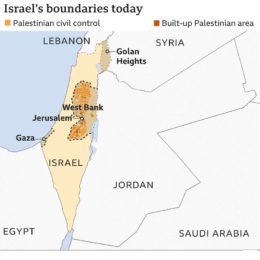
What is going on now?
- Tensions between Israel and Palestinians in East Jerusalem, Gaza, and the West Bank are frequently high.
- Gaza is administered by the Palestinian militant group Hamas, which has frequently clashed with Israel. Israel and Egypt carefully monitor Gaza’s borders to prevent weapons from reaching Hamas.
- Palestinians in Gaza and the West Bank believe Israeli measures and restrictions are causing them pain. Israel claims it is just acting to defend itself against Palestinian violence.
What are the Global Consequences of the Conflict?
- Destabilise the geopolitical realignment Middle East Process- The Middle East has recently seen geopolitical realignments ranging from Israel-Arab reconciliation to Iran-Saudi détente. However, the recent war would derail the Middle Eastern countries’ efforts to achieve peace and normalcy.
- Make the Middle East a battlefield- The Middle East has served as a battlefield in conflicts such as the Gulf War, the Iraq War, and the Six-Day War. The latest dispute has the potential to escalate into a full-fledged war involving foreign countries such as the United States and the European Union. This would turn the region into a theatre for proxy warfare between the US and Iran.
- Disrupt global connectivity initiatives and global transportation routes- This extended conflict will impair projects such as the India Middle East Economic Corridor (IMEC). The conflict’s escalation would jeopardise critical supply routes such as the Strait of Hormuz and the Red Sea.
- Disrupt global supply chains and raise inflation- The escalation of the conflict will have an impact on oil production and product supply. This will ratchet up inflation, which is already upsetting the global economy.
The proposed solution to the Israel-Palestine Conflict
- Solution in two states: The two-state solution refers to a regional structure in which Israeli and Palestinian governments coexist.
- One-state solution: A unified Israel, West Bank, and Gaza would reduce Jews to a minority.
- Three-state solution: Because Hamas controls Gaza, some argue that the reality is now a three-state solution, with Gaza as a separate state.
- There are five states: According to the Centre for Strategic and International Studies (CSIS), the region now has five states rather than the two originally planned.
What effect will the Israel-Palestine conflict have on India?
India has taken sides in the latest conflict by supporting Israel. Any extended confrontation, however, will not bode well for India.
- Effects of our De-hyphenation and West Asia strategy- India has successfully implemented its De-hyphenation strategy in the region. Both India’s relations with the Arab World and with Israel have improved. However, the current crisis puts India in a diplomatic bind, forcing it to pick a side. India, too, cannot afford to lose.
- Inflationary Pressures- Any extended conflict in the Middle East will have an impact on oil and gas production. Because India is heavily reliant on imported oil and gas, inflation will rise further.
- The Impact on India-Israel Trade-Israel is India’s key defence and strategic partner. The involvement of Israel in the conflict for an extended length of time will significantly affect trade between India and Israel. India’s overall exports to Israel were $8.4 billion in FY23, while imports from Israel were $2.3 billion.
- Currency depreciation- The dispute will have an impact on the influx of FPI and FDI into the Indian financial industry. Oil price increases may exacerbate India’s Current Account Deficit (CAD). All of this will cause the Indian rupee to depreciate.
India’s Policy on Israel-Palestine Issue
- India’s statement in the UN Security Council aims to strike a compromise between its long-standing ties with Palestine and its growing ties with Israel.
- India’s position towards the world’s longest-running conflict has shifted from clearly pro-Palestine for the first four decades to a delicate balancing act with its three-decade-old close ties with Israel. In recent years, India’s stance has also been interpreted as pro-Israel.
- In 1948, India was the only non-Arab state to vote against the UN partition plan for Palestine in the General Assembly, which resulted in the establishment of Israel.
Scholars attribute several causes for India’s Partition, including religious reasons, being a fledgling nation that had just shaken off its colonial yoke, and solidarity with the Palestinian people who would be dispossessed.
and to prevent Pakistan from isolating India over Kashmir.
- The balance began with India’s decision to normalise relations with Israel in 1992, against the backdrop of the Soviet Union’s disintegration and huge developments in West Asian geopolitics as a result of the first Gulf War in 1990.
- The establishment of an Indian embassy in Tel Aviv in January 1992 signified the end of four decades of ignoring Israel.
- Since 1992, the India-Israel relationship has grown steadily, primarily through arms transactions and cooperation in fields such as research, technology, and agriculture. However, India never fully recognized the link.
- From 2018, India would “de-hyphenate” the Israel-Palestine relationship and deal with each independently.
Meanwhile, India continues to strengthen ties with Arab countries, particularly Saudi Arabia and the United Arab Emirates and feels vindicated by the decision of several Arab states to strengthen ties with Israel.
What should India consider before embracing Israel?
India’s major concerns before endorsing Israel are as follows:
- India’s energy security was still dependent on the Arab Nations.
- Before strengthening ties with Israel, India should assess its relations with Saudi Arabia and Iran. Saudi Arabia has yet to accept Israel as a country, and Iran supports the Palestinian cause. Any direct investment in Israel would have an impact on our relations with these countries.
Way forward
Israel wants India to abandon its pro-Palestine position. India cannot overlook Israel’s defence and technological ties. However, beyond strategic relations with Israel, India cannot afford to overlook its vital energy relationships with Iran and the Gulf countries. It should also be noted that India’s candidature requires the unequivocal support of the Arab countries, which constitute a sizable bloc in the UN General Assembly.
It should be noted that India has been very anxious to maintain a pragmatic balancing act between regional players in the West Asian region such as Saudi Arabia and Iran. Similarly, India should be cautious when supporting Israel and should take a more balanced and pragmatic approach when dealing with Israel and Palestine.
Best Online Coaching for Civil Service_IAS_ UPSC_IFS_IPS
Free Study Material ENSEMBLE IAS ACADEMY | Call +91 98115 06926 | Visit us:- https://ensembleias.com/ | Online Store: https://online.ensemble.net.in/
#israel_palestine_issue #War #Golanheights #WestBank #GazaStrip # Middleeast #India_stand_on_Israel #International_relation #PSIR #Upsc_current_affairs #news #GSPaper #UPSC #civil_services_study #ensemble_ias_academy #geography_optional #k_siddharthasir #ias #upsc_exam #civilservices #upsc_motivation #upsc_aspirants #trendsingeography



